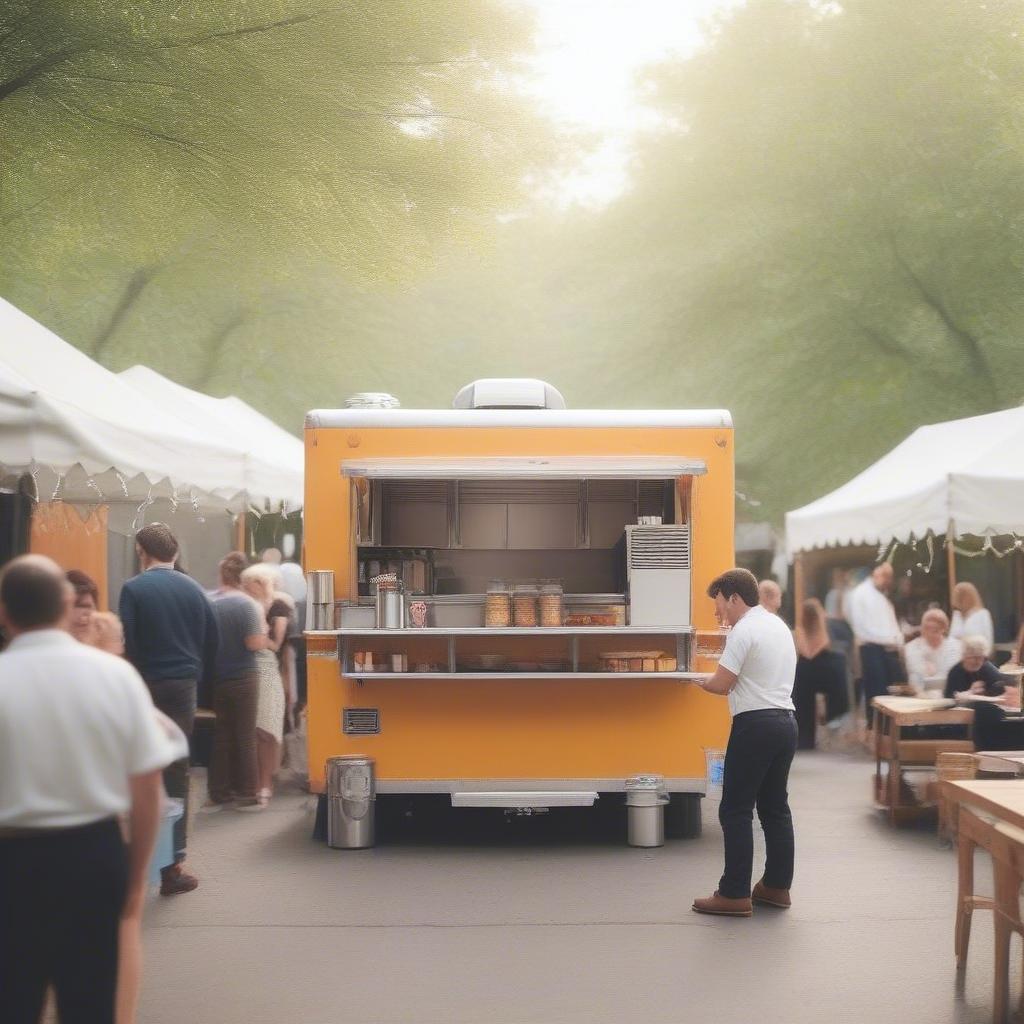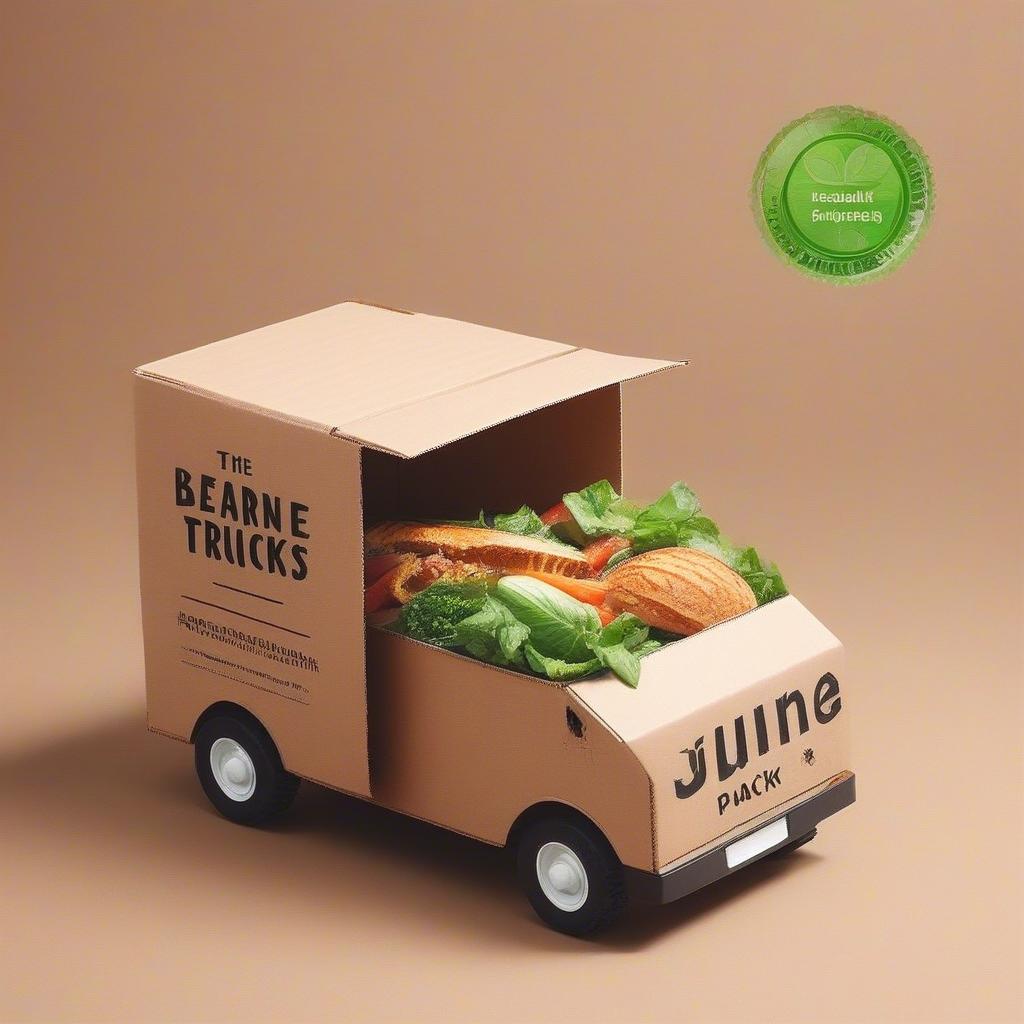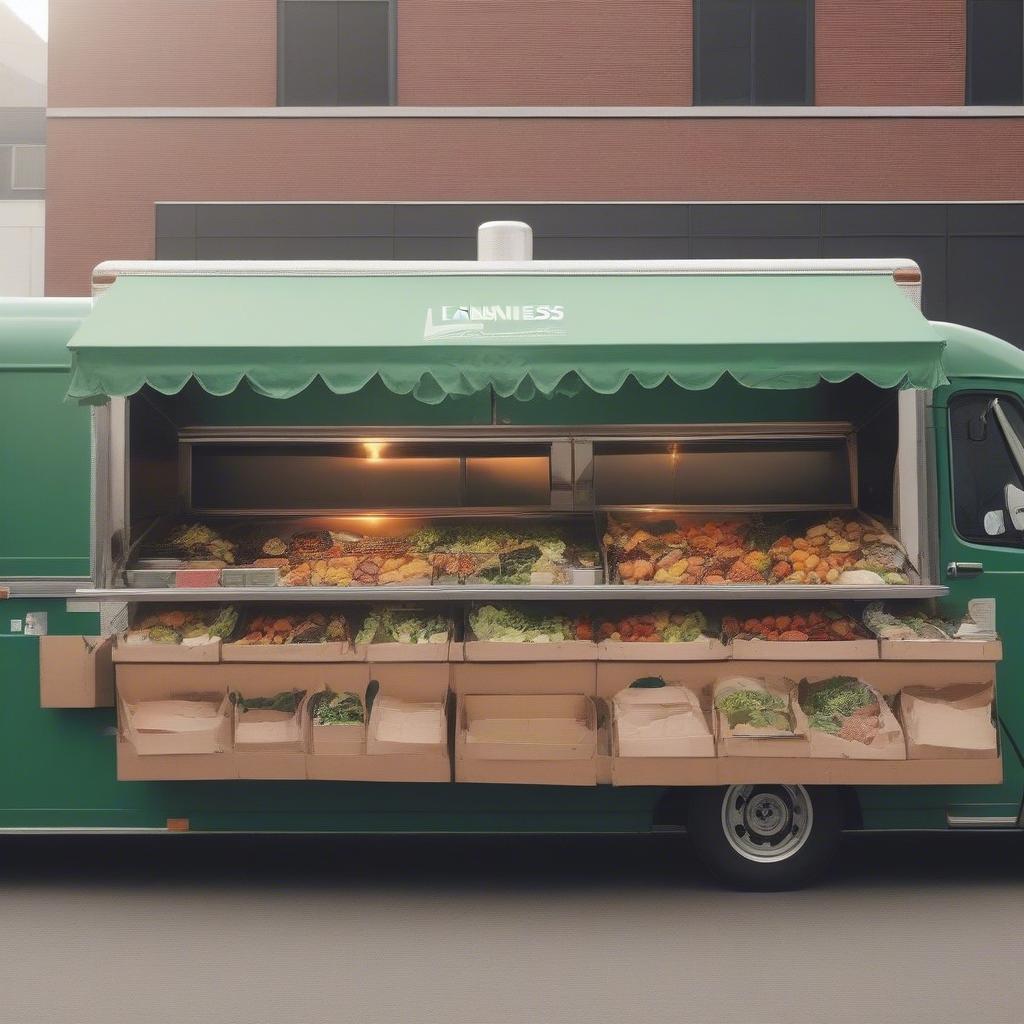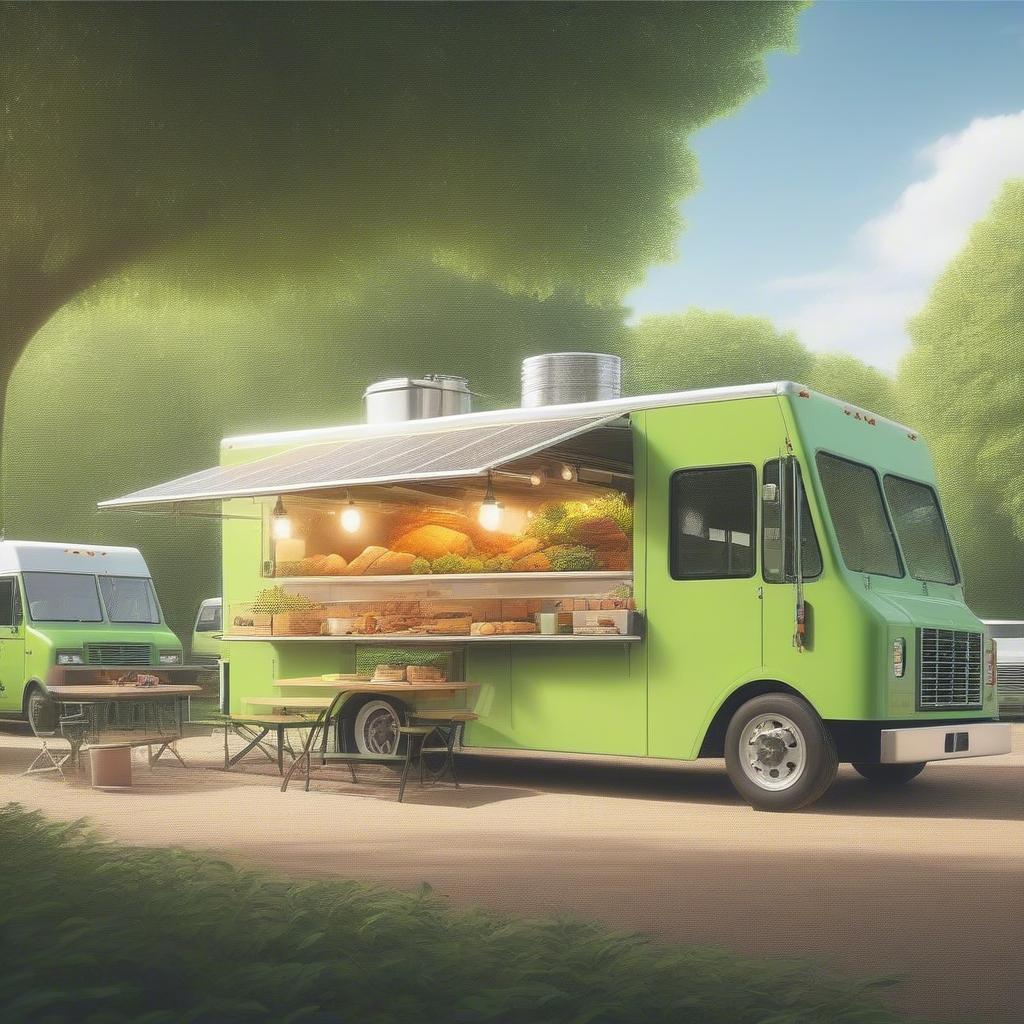
The rumble of a well-oiled engine, the sizzle of delicious food, and the excited chatter of a gathering – that’s the magic a food truck can bring to a private event. It’s more than just serving meals; it’s about creating an unforgettable experience. But transforming your mobile kitchen into a private catering powerhouse requires careful planning and execution. This guide dives deep into every aspect of setting up your food truck for private events, ensuring you not only meet but exceed expectations.
Understanding the Private Event Landscape
Why Choose Private Events?
Venturing into private events offers significant advantages for food truck businesses:
- Higher Profit Margins: Private events often command a premium compared to regular street service, allowing you to increase your profitability per event.
- Guaranteed Revenue: You know exactly how much you’ll be paid and how much food to prepare, reducing waste and maximizing efficiency.
- Targeted Customer Base: Private events allow you to cater to a specific audience, leading to more personalized menus and potentially, repeat business.
- Building Brand Recognition: Providing excellent service at private events can enhance your brand image and reputation, leading to future referrals.
- More Consistent Work: Booking private events creates a more consistent stream of income and allows you to plan your schedule more effectively.
Types of Private Events Suitable for Food Trucks
The versatility of a food truck makes it suitable for a wide range of private events, including:
- Weddings: Serve late-night snacks, cocktail hour appetizers, or even the full wedding meal.
- Corporate Gatherings: Cater office lunches, team-building events, or company parties.
- Birthday Parties: Offer themed menus for kids’ parties or gourmet options for adult celebrations.
- Graduation Parties: Provide convenient and delicious food for graduates and their guests.
- Neighborhood Block Parties: Contribute to community events with your mobile kitchen.
- Festivals and Fairs (Private Sections): Serve VIP or staff areas within larger public events.
- Family Reunions: Bring everyone together with crowd-pleasing comfort food.
Initial Steps Before the Event: Planning and Preparation
Initial Client Consultation: Clarifying Expectations
A successful private event begins with a thorough initial consultation with the client. This is your opportunity to:
- Understand the Event Vision: Discuss the event’s purpose, theme, and desired atmosphere.
- Determine Guest Count: Accurately estimate the number of guests to plan your food quantities and staffing needs.
- Discuss Budget: Establish the client’s budget to create a menu and service package that aligns with their financial parameters.
- Outline Menu Preferences: Discuss dietary restrictions, allergies, and desired food types. Offer suggestions based on your expertise and the event’s nature.
- Confirm Service Style: Decide whether it’ll be buffet-style, plated meals, passed appetizers, or a combination.
- Establish the Event Schedule: Discuss the timing of food service, setup and takedown requirements.
- Clarify Location and Access: Assess the event location, accessibility for your food truck, power and water sources, and waste disposal options.
- Set a Payment Schedule: Determine the deposit, payment schedule, and payment methods.
Creating a Contract: Protecting Your Business
Once you’ve finalized the details, it’s crucial to create a comprehensive contract to protect your business and ensure a smooth transaction. Your contract should clearly outline:
- Event Details: Date, time, and location of the event.
- Services Provided: Detailed description of the food, service style, and any additional services offered.
- Menu Items: Complete list of the food and beverage items you will provide.
- Pricing and Payment Schedule: Breakdown of costs, deposit amount, and payment due dates.
- Cancellation Policy: Clearly stated terms for cancellations by either party.
- Liability Clause: Protect your business in case of unforeseen circumstances.
- Insurance Coverage: Ensure you have adequate insurance to cover any potential accidents or damages.
Menu Planning: Balancing Creativity and Practicality
Crafting the perfect menu for a private event requires balancing creativity with practicality:
- Consider the Client’s Preferences: Tailor the menu to the client’s requests and dietary restrictions.
- Offer Variety: Include a variety of options to cater to different tastes.
- Prioritize Food Safety: Plan a menu that can be safely prepared and served from your food truck environment.
- Focus on Efficiency: Choose menu items that can be produced efficiently and quickly in a mobile kitchen.
- Factor in Seasonality: Utilize seasonal ingredients for freshness and cost-effectiveness.
- Consider Event Theme: Tailor the menu to complement the event’s theme or style.
- Provide Tasting Sessions (if applicable): Offer the client a chance to sample menu options before the event.
Staffing and Logistics: Teamwork Makes the Dream Work
Proper staffing and logistics are critical for smooth operation during a private event:
- Staffing Needs: Determine the number of staff needed based on event size and service style.
- Assign Roles: Clearly define roles and responsibilities for each staff member.
- Create a Prep List: Develop a detailed preparation list to ensure all food and supplies are ready.
- Plan Transportation: Arrange for reliable transportation of your food truck and equipment.
- Secure Permits and Licenses: Ensure you have all necessary permits and licenses for the event location.
- Coordinate with Event Planner: Communicate with the event planner to ensure seamless coordination of food service with other aspects of the event.
On-Site Setup and Execution
Setting Up Your Food Truck: Creating an Efficient Workspace
Setting up your food truck correctly on-site is crucial for efficiency:
- Choose Optimal Location: Park your food truck in a location that is easily accessible, visible, and provides a safe and efficient workspace.
- Level Your Truck: Ensure your food truck is properly leveled for safe and efficient cooking.
- Connect Utilities: Connect to power and water sources, ensuring proper functioning of all equipment.
- Set Up Prep Areas: Organize prep areas, including cutting boards, ingredient stations, and serving supplies.
- Stock Up Supplies: Ensure you have enough food, beverages, and packaging materials.
- Set Up Sanitation Stations: Provide hand washing stations, sanitizing supplies, and trash receptacles.
Maintaining Food Safety: A Top Priority
Food safety should always be a top priority, especially during private events:
- Maintain Proper Temperatures: Keep cold food cold (below 40°F) and hot food hot (above 140°F).
- Use Food Thermometers: Regularly check food temperatures to ensure they reach safe levels.
- Practice Proper Hygiene: Ensure all staff members follow strict hand washing procedures.
- Avoid Cross-Contamination: Use separate cutting boards and utensils for different types of food.
- Properly Store Food: Store food at proper temperatures and in sealed containers.
- Label Everything: Label all food containers with the date and time of preparation.
- Handle Food Carefully: Implement safe food handling practices for serving and transporting food.
Delivering Exceptional Customer Service: Making a Lasting Impression
Exceptional customer service is key to making your food truck stand out at private events:
- Be Friendly and Approachable: Greet guests with a smile and positive attitude.
- Anticipate Needs: Proactively address guest needs before they have to ask.
- Be Knowledgeable About the Menu: Be able to answer questions about ingredients, preparation methods, and dietary information.
- Provide Prompt and Efficient Service: Ensure quick and efficient food service.
- Be Adaptable: Be ready to handle unexpected situations or changes in guest numbers.
- Gather Feedback: Encourage guests to provide feedback, which can help improve future service.
Post-Event Procedures: Following Up for Future Success
Clean Up and Pack Down: Leaving No Trace
After the event concludes, it’s important to clean up properly and leave the site in pristine condition:
- Remove Trash and Waste: Dispose of all trash and waste materials properly.
- Clean Your Truck: Clean all surfaces inside your food truck, including equipment, counters, and floors.
- Restock Supplies: Replenish food, beverages, and packaging materials.
- Secure Your Truck: Lock all doors and storage compartments.
- Leave the Site Tidy: Ensure the event location is left clean and free from debris.
Follow Up with the Client: Building Relationships
Following up with the client after the event helps solidify relationships and increase chances of repeat business:
- Send a Thank You Note: Express your gratitude for their business.
- Request Feedback: Ask for feedback on your service to identify areas for improvement.
- Ask for Testimonials: Request a testimonial that you can use for marketing purposes.
- Offer Future Event Bookings: Propose your services for future events.
- Stay in Contact: Maintain communication with the client for potential future opportunities.
Marketing Your Private Event Catering Services: Reaching Your Target Audience
Online Presence: Establishing Your Authority
A strong online presence is essential for attracting private event bookings:
- Website: Create a professional website that showcases your menu, services, and contact information.
- Social Media: Use social media platforms to promote your services and showcase your food.
- Online Directories: List your food truck on online catering directories.
- Local SEO: Optimize your website and online listings for local search terms.
- Engage with Customers: Interact with potential clients on social media and respond to inquiries promptly.
- Showcase Your Work: Post high-quality photos of your food and services.
Networking: Building Connections
Networking is a powerful tool for growing your private event catering business:
- Attend Industry Events: Network with event planners and other catering professionals.
- Join Local Business Groups: Connect with local business owners and potential clients.
- Partner with Event Venues: Collaborate with local event venues to become a preferred caterer.
- Seek Referrals: Ask satisfied clients to refer you to other potential clients.
- Attend Community Events: Participate in local community events to promote your services.
Pricing Strategies: Balancing Profit and Value
Develop a pricing strategy that is competitive yet profitable:
- Cost-Based Pricing: Calculate your costs to ensure you cover expenses and generate a profit.
- Value-Based Pricing: Price your services based on the perceived value you provide to the client.
- Tiered Pricing: Offer different menu options and service packages at varying price points.
- Consider Competitors: Research your competitor’s pricing to stay competitive in the market.
- Offer Custom Quotes: Provide personalized quotes for each private event based on specific requirements.
Catering Tips for Success
Essential Equipment Checklist
Having the right equipment is vital for efficient and smooth catering:
- Cooking Equipment: Grills, fryers, stovetops, ovens (if applicable)
- Prep Tools: Knives, cutting boards, mixing bowls, measuring cups
- Serving Equipment: Serving spoons, chafing dishes, platters, tongs
- Refrigeration: Coolers, refrigerated storage units
- Power and Utilities: Generators, extension cords, water hoses
- Sanitation Supplies: Hand soap, paper towels, sanitizer, trash bags
- Packaging and Disposables: Plates, cutlery, napkins, to-go containers
Maximizing Efficiency in a Mobile Kitchen
Efficiency is crucial in a food truck environment:
- Organize Your Workspace: Keep all supplies and equipment within easy reach.
- Streamline Food Preparation: Pre-prep as much as possible before the event.
- Minimize Waste: Plan your menu to reduce food waste.
- Batch Cooking: Prepare items in batches to save time.
- Delegate Tasks: Assign specific tasks to each staff member.
Addressing Challenges: Troubleshooting Common Issues
Be prepared to address common challenges that may arise:
- Equipment Malfunction: Have a backup plan in case equipment malfunctions.
- Power Outage: Ensure you have backup power sources.
- Food Spoilage: Implement proper food safety practices to prevent spoilage.
- Staff Shortages: Have a backup plan in case of staff shortages.
- Unexpected Guest Numbers: Be prepared to adjust to unexpected guest numbers.
- Communication Barriers: Develop clear communication protocols for your staff.
Learn Business: Your Partner in Success
Starting and growing a food truck business, particularly in the competitive private event space, can be challenging. This is where Learn Business steps in. Learn Business supports entrepreneurs by providing expert guidance, tailored templates, and valuable resources to streamline business operations. We understand the unique demands of the food truck industry and offer tools that are specifically designed to address those challenges.
Here’s how Learn Business can support your private event food truck business:
- Comprehensive Business Plan Templates: Develop a solid foundation for your business with templates designed to meet your specific goals.
- Financial Management Tools: Track your expenses, monitor revenue, and manage your cash flow effectively with templates for budgeting, invoicing, and financial forecasting.
- Marketing and Sales Strategies: Develop a targeted marketing plan that helps you attract more private event bookings.
- Contract Templates: Protect your business with customized contract templates to ensure smooth transactions with clients.
- Menu Planning Templates: Create visually appealing and strategic menus for your food truck with templates that allow for easy customization.
- Staff Management Templates: Optimize your staffing schedules and employee management with effective tracking tools.
- Legal Compliance Assistance: Gain an understanding of all legal and regulatory requirements for operating a food truck and serving private events.
- Customer Relationship Management Tools: Maintain lasting connections with your clients for repeat bookings.
By leveraging Learn Business’s resources, you can navigate the complexities of the food truck industry with confidence and build a sustainable and thriving business. We provide the knowledge, tools, and support you need to succeed in the competitive private event catering market.
Conclusion
Setting up your food truck for a private event involves meticulous planning, preparation, and execution. By understanding the nuances of the private event landscape, developing strong business practices, and offering exceptional customer service, you can transform your food truck into a highly sought-after mobile catering option. Remember, the key to success lies in your attention to detail, your commitment to quality, and your ability to adapt to the unique demands of each event. With the right approach and the support of resources like Learn Business, your food truck can achieve its full potential in the rewarding world of private event catering. Use these catering tips and your success will be guaranteed.



Leave a Reply